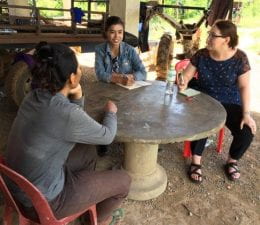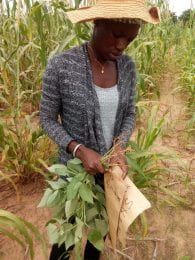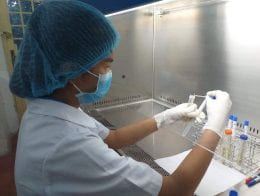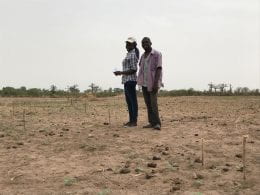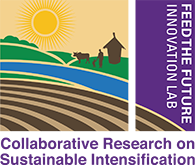Soa Phourn participates in one of her graduate classes at the University of Battambang.
“It didn’t feel good when they said that I’m big, like an older person, when I
joined school. But I felt, like, I want to study,” Soa Phourn describes
beginning primary school. “I felt shy because I’m the oldest person in the
school. Others were only like six years old they started grade one, but for
me, starting at 10, it wasn’t good.”
Soa Phourn started school four years late. Not because of a lack of desire to study, but because her family lived out in the rice fields, far from the village school. Only when she was 10 years old did the family move to the village,
making studying possible. Yet she persevered and has now gone through 17
years of studies, currently pursuing her master’s degree in Sustainable
Agriculture at the University of Battambang (UBB).
Soa Phourn has not only overcome obstacles to achieve her educational
goals, but she’s also defied the odds. In Cambodia, only 12
percent of the female population in 2017 was enrolled in tertiary education
(UNESCO, 2019). Soa Phourn is in an even more select group in that she’s
now completing graduate studies. Despite the small proportion of women
pursuing higher education and the taboos against it, Soa Phourn has never
lost her determination.
Soa Phourn interprets an interview with a local farmer from Khmer to English for the Cambodia WAgN project.
Soa Phourn became involved in Feed the Future in 2019 through the
Cambodia Women in Agriculture Network (WAgN) Project implemented
by The Pennsylvania State University. When Penn State graduate student
Emily Southard needed an interpreter to conduct her thesis fieldwork on
gender in vegetable value-chains, Soa Phourn’s professors at the UBB
eagerly recommended her.
“Soa Phourn has been instrumental in the success of my research,” Emily
explains. “She has helped me to understand customs, has gone above and
beyond in the research, and we have both learned so much from one
another.”
The collaboration between the two students has not only benefited Emily by
strengthening her research, it has also benefited Soa Phourn, both financially
and educationally. Soa Phourn explains that participating as a translator has
helped her support her education, improve her English, and also develop
skills she’ll use when she fulfills her goal of owning her own farm. “I also
learn from working with you, when I interview a seller or trader. I think that
I can learn a lot from the trader or the seller about having a business. If I
want to start a farm, I need to learn from them.”
Soa Phourn identifies plants at the plant shop at UBB.
Working as part of the Cambodia WAgN project was actually not Soa
Phourn’s only contribution to the work of Feed the Future, however.
She has also interned at the Feed the Future funded sustainable
intensification experiment farm operated in tandem with UBB. This farm
has given many UBB students exceptional hands-on experience to
conduct research, gain horticultural skills, and improve business skills as
they sometimes sold produce from the farm.
For Soa Phourn, these opportunities from Feed the Future have been
essential to her ability to continue to fund her education. She has taken
on a variety of jobs to subsidize her education, including providing
interpreting services to other research projects and working at the plant
shop at UBB, pictured above.
These opportunities allow Soa Phourn to overcome the discouraging
judgment she receives from some neighbors in her village who frown on
her pursuit of higher education. These neighbors say that a “person that
always studies always spends their family’s money and never earn any
income to support their family.” Through these opportunities, she’s able
to better support herself and depend less on her family to assist her.
Soa Phourn is determined to prove these neighbors wrong. She plans to
combine the education she’s received with the business skills she’s learned
from working hands-on with farmers and sellers, such as through the
Cambodia WAgN project. She aspires to be an entrepreneur, she explains
“because when I work, then I just earn a salary, only a salary. But when I study agriculture, I can make a business and earn more money.”
Her ultimate goal is to earn enough money by running her own farm to
reunite her family, as her sisters are all currently migrant workers in Thailand.
“I have always hoped that one day I can make… more money to bring my
sisters back from Thailand to live in Cambodia. I want them to not
have to live far away from my mother.”
Soa Phourn’s experiences, accomplishments, and ambitions demonstrate how
Feed the Future is contributing to its goals of empowering women,
encouraging youth involvement in agriculture, and increasing agricultural
productivity. Through Soa Phourn’s involvement in Feed the Future, she has
been able to help fund her education and overcome obstacles. As a result, she
is among the small proportion of Cambodian women pursuing graduate
education, despite getting a late start in school due to her rural upbringing. By
achieving her aspirations in agricultural entrepreneurship, Soa Phourn hopes
to become a mentor in the community for other young women and youths
who want to pursue agriculture. Her education in horticulture and sustainable
agriculture will allow her to be an efficient, productive, sustainable, and
successful farmer, strengthening Cambodia’s agricultural sector.

Soa Phourn at the University of Battambang. Article written by Emily Southard - graduate student from the Pennsylvania State University, USA

